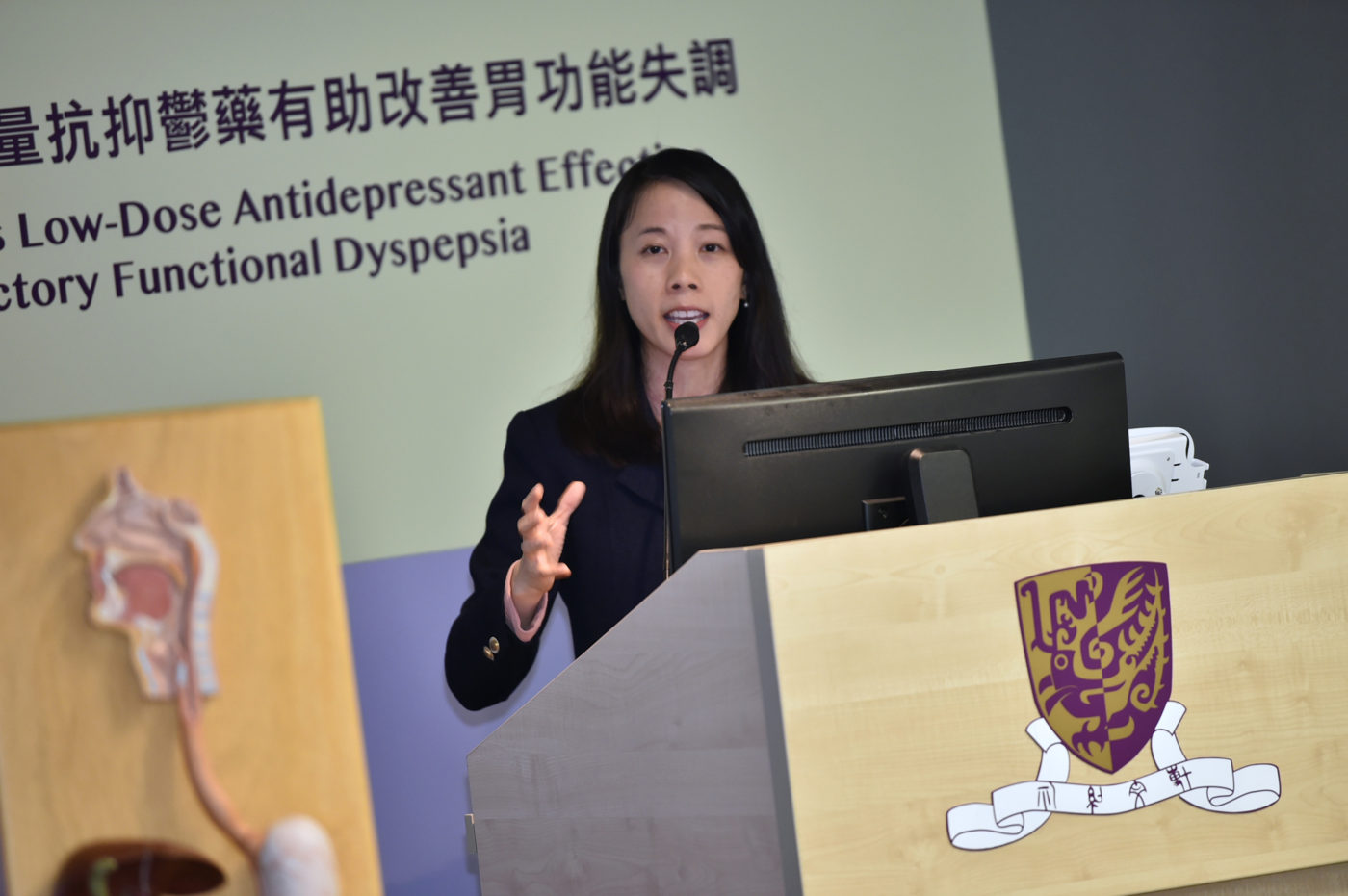CUHK Study Proves Low-Dose Tricyclic Antidepressant (TCA) Effective in Treating Patients with Refractory Functional Dyspepsia
- admin
- 2019-03-08
- News, Other news
A recent study conducted by The Faculty of Medicine of The Chinese University of Hong Kong (CUHK) proved that low-dose imipramine, a tricyclic antidepressant, is efficacious for patients with refractory functional dyspepsia and 64% of the recruited subjects were satisfied with the outcome. The finding has been published in the international medical journal The Lancet Gastroenterology & Hepatology.
About 11% of people in Hong Kong are suffering from functional dyspepsia
Dyspepsia can be caused by Helicobacter pylori infection or other organic gastric diseases. However, patients with no identifiable cause are classified as having “functional dyspepsia”. They appear to have continuous or repeated attacks of early satiety, fullness, or epigastric pain or burning. The symptoms can last for years and disturb the flow of everyday life. The prevalence of functional dyspepsia is about 11% in Hong Kong, affecting 730,000 people.
Professor Justin Che Yuen WU, Professor, Division of Gastroenterology and Hepatology, Department of Medicine and Therapeutics, Faculty of Medicine, CUHK remarked, “The first-line standard treatment of functional dyspepsia is usually proton pump inhibitors (PPIs) or prokinetics. PPIs reduce stomach acid production whereas prokinetics increase gastrointestinal motility, but these first-line therapies are only effective in about 30% of the patients. For the other ‘refractory’ patients, stress and emotions have major contributing role. It is estimated that 500,000 people are suffering from refractory functional dyspepsia.”
Tricyclic antidepressants relieve dyspepsia symptoms but carry side-effects
There is a lack of data supporting the efficacy of TCAs for patients with functional dyspepsia that does not respond to PPIs or prokinetics. Hence, a research team from the Faculty of Medicine at CUHK launched a related study recruiting 107 patients with functional dyspepsia that does not respond to PPIs or prokinetics, to investigate the efficacy of TCAs.
The participants were randomly assigned to two groups; the intervention group received a low dose of imipramine, a kind of TCAs, while the control group received a placebo. The team evaluated the change of eight dyspepsia symptoms via questionnaire before and after 12 weeks of treatment. The symptoms include epigastric pain, epigastric burning, postprandial fullness, early satiety, belching, bloating, nausea and vomiting. They also assessed if patients experienced insomnia, mood problems or other adverse events. Results showed a low-dose imipramine is effective in controlling dyspepsia symptoms and lowers the level of anxiety.
| Received imipramine (55 patients) |
Received placebo (52 patients) |
|
| Overall satisfactory relief of dyspepsia symptoms | 63.6% (35 patients) |
36.5% (19 patients) |
Ms. Pui Kuan CHEONG, Research Associate, Division of Gastroenterology and Hepatology, Department of Medicine and Therapeutics, Faculty of Medicine, CUHK and the designer of the study, said, “This is the first randomised, double-blind clinical trial that proves the efficacy of TCAs in the treatment of functional dyspepsia. We hope this can help provide patients with an extra therapeutic option. One point to note is that we suggest only using a low dose of imipramine since TCAs carry some side-effects such as dry mouth, constipation, blurred vision, drowsiness and palpitation in a small proportion of patients. It should be administered under doctor’s supervision after proper assessment.”
Ms. Yawen CHAN, Clinical Psychologist, Hong Kong Institute of Integrative Medicine, Faculty of Medicine, CUHK said, “Our previous studies have proven dyspepsia is strongly associated with anxiety and depression. Our emotional health is directly linked with the development of our physical and psychological health and therefore if any patient has been suffering from gastrointestinal disorders for a long time without identifiable cause, he or she may consider seeking help from emotional health experts.”

A recent study by the Faculty of Medicine of CUHK proved that low-dose imipramine, a tricyclic antidepressant (TCA), is efficacious for patients with refractory functional dyspepsia. (From left: Functional dyspepsia patient Ms. LEE; Ms. Yawen CHAN, Clinical Psychologist, Hong Kong Institute of Integrative Medicine, Faculty of Medicine; Professor Justin Che Yuen WU and Research Associate Ms. Pui Kuan CHEONG from the Division of Gastroenterology and Hepatology, Department of Medicine and Therapeutics, Faculty of Medicine, CUHK)

Professor Justin WU reminds that a small proportion of patients may experience side effects after taking TCAs. As such, the treatment should be administered under doctors’ supervision after proper assessment.

Ms. Yawen CHAN says patients of functional dyspepsia often appear with anxiety symptoms. She reminds the public to take care of emotional health.

Ms. LEE (right) had been suffering from functional dyspepsia for years before realizing that it was linked to her negative emotions. By managing her psychology positively, she has improved her physical condition and no longer needs any medication.
Source: The Chinese University of Hong Kong
